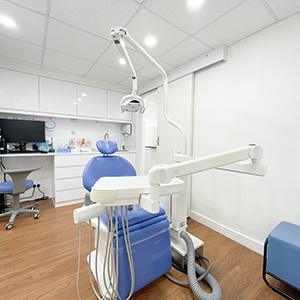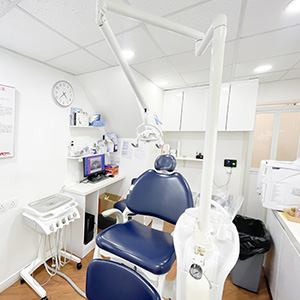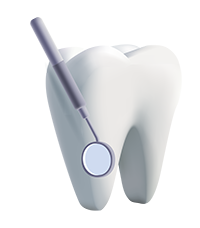Root Canal Treatment (Endodontic (Pulp) Treatment)
Home > Oral Services > Advanced Dental Treatment – Root Canal Treatment (Endodontic (Pulp) Treatment)

Root Canal Treatment (Endodontic (Pulp) Treatment)
When teeth are decayed too deeply, broken, or severely worn down, it may affect the dental pulp layer, stimulate the dental nerve, causing severe toothache in patients, and even lead to infection spreading to the periodontal tissues and alveolar bone, forming an abscess, triggering serious complications.
In order to completely eliminate the infection in the dental pulp while preserving the tooth, root canal treatment may be necessary. Dentists will remove the damaged and infected dental pulp tissue, clean the inside of the tooth, and then fill it to prevent further infection. This treatment is called root canal treatment.
Treatment Procedure For Root Canal:
- The dentist will first disinfect your tooth, then access the dental pulp from the crown of the tooth and remove infected or damaged pulp tissue.
- Next, the dentist will clean the entire pulp chamber of the tooth with a solution, possibly using different medications for adjunctive therapy.
- Finally, the dentist will fill and seal the pulp chamber, covering the tooth hole with a resin to reduce the risk of bacteria re-entering.
- If the tooth becomes fragile after root canal treatment, the dentist may recommend installing a crown to enhance protection for the tooth.
Q&A
- What Is Root Canal Treatment?
- I Am Not in Pain — Why Do I Need a Root Canal?
- When Is A Root Canal Really Necessary?
- What Should Be Noted After Having Root Canal Treatment?
- What to Expect During a Root Canal Treatment?
Root canal treatment, also known as endodontic treatment, is a procedure used to treat severe tooth decay or bacterial infection of the dental pulp. When a severe bacterial infection reaches the dental pulp at the center of the tooth, it damages the pulp tissue, stimulates the nerve fibers inside the tooth, causing severe tooth pain and inflammation. At this point, root canal treatment is necessary to thoroughly remove the infected and damaged pulp to prevent further deterioration of the tooth.
Root canal treatment, also known as endodontic treatment, involves removing damaged and infected pulp, cleaning and disinfecting the pulp, filling, and sealing the tooth to preserve it. Many people believe that a simple filling is sufficient for a cavity, but in reality, a filling only addresses issues on the tooth’s surface. If a cavity extensively erodes into the dental pulp, causing the nerve fibers of the tooth to die, leading to intensified pain, a filling will not alleviate the pain. In such cases, root canal treatment is the optimal method to preserve the tooth.
Whether you need root canal treatment depends on the following conditions:
- Severe tooth decay: Infection has reached the dental pulp.
- Tooth fracture, wear, or severe breakage.
- Tooth has undergone multiple dental treatments.
The above conditions may damage the dental pulp inside the tooth, affecting the dental nerve, causing tooth pain, and even leading to infection spreading to the periodontal tissues and alveolar bone, resulting in more serious oral and dental problems.
If a dentist evaluates the tooth and determines that it can still be saved, root canal therapy is advised in order to preserve the tooth.
After undergoing root canal treatment, it is crucial to properly care for the treated tooth as it has lost its original dental pulp tissue and may become fragile, making it prone to fracturing when chewing on hard objects:
Avoid Chewing Hard Foods:
After a root canal, the tooth has lost its original dental pulp tissue and may become fragile, causing it to break easily when chewing on hard things. Therefore, it is very important to take good care of the treated tooth:
Pay Attention To Your Oral And Dental Hygiene
Tooth decay may still occur due to poor oral hygiene, even after infected tissue has been removed during root canal therapy. Consequently, it is critical to maintain proper dental and oral hygiene practices.
Regular Follow-Up Examinations
A dental examination every six months aids in the ongoing observation of the state of the tooth. Dentists are able to identify problems early on and treat patients appropriately to stop their condition from getting worse.
- The entire root canal treatment generally requires two to three treatment sessions and usually does not require antibiotics.
- For individuals who have received local anesthesia injections during treatment, avoid biting the lips or tongue until full sensation has returned.
- If temporary filling material falls out, it is important to see a dentist promptly to prevent bacteria from saliva entering the pulp chamber.
- Mild sensitivity or swelling may occur after treatment, which is a normal reaction. Pain medication can be taken if needed.
- Slight discomfort may be felt by patients who have severe tooth inflammation or who are sensitive to filling materials.
- If pain intensifies, gums swell, or any discomfort arises, contact the dentist immediately.
- Return for a follow-up appointment at the clinic after six months for the dentist to check on the status of your tooth.

















